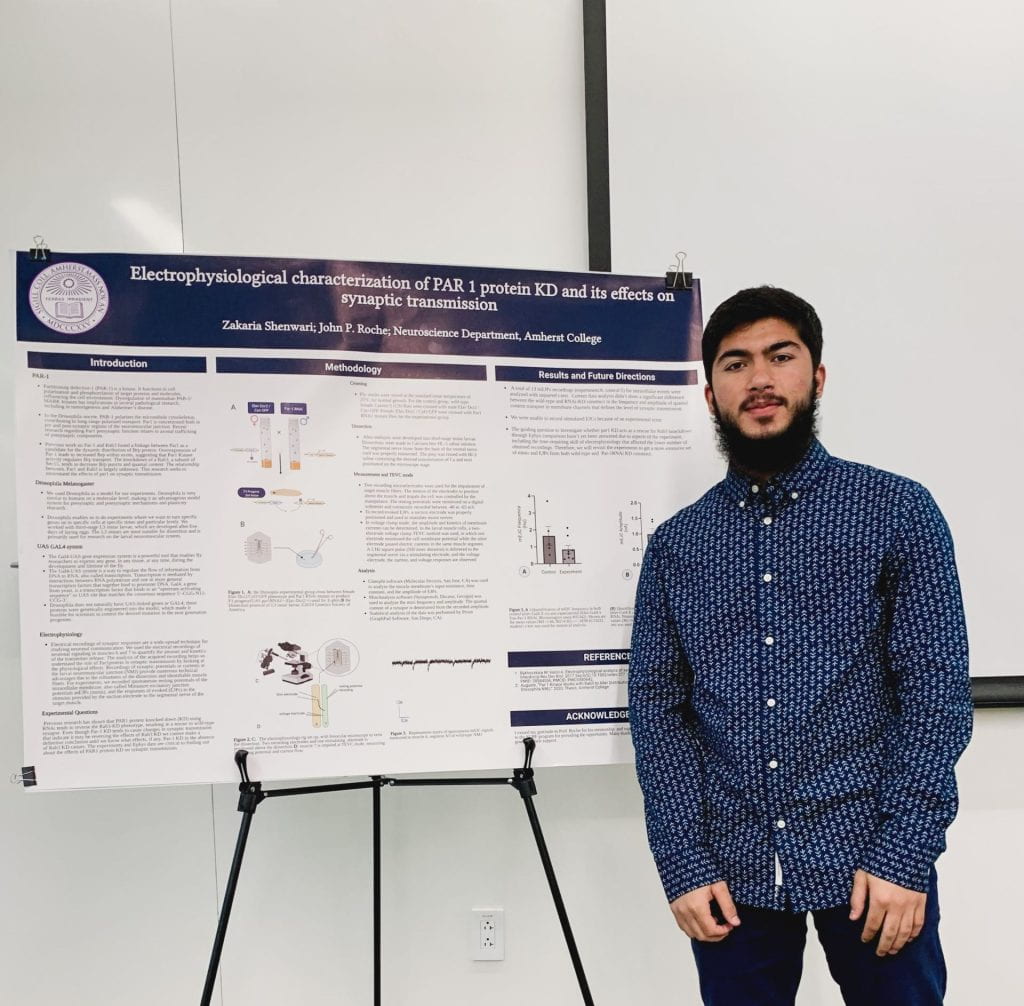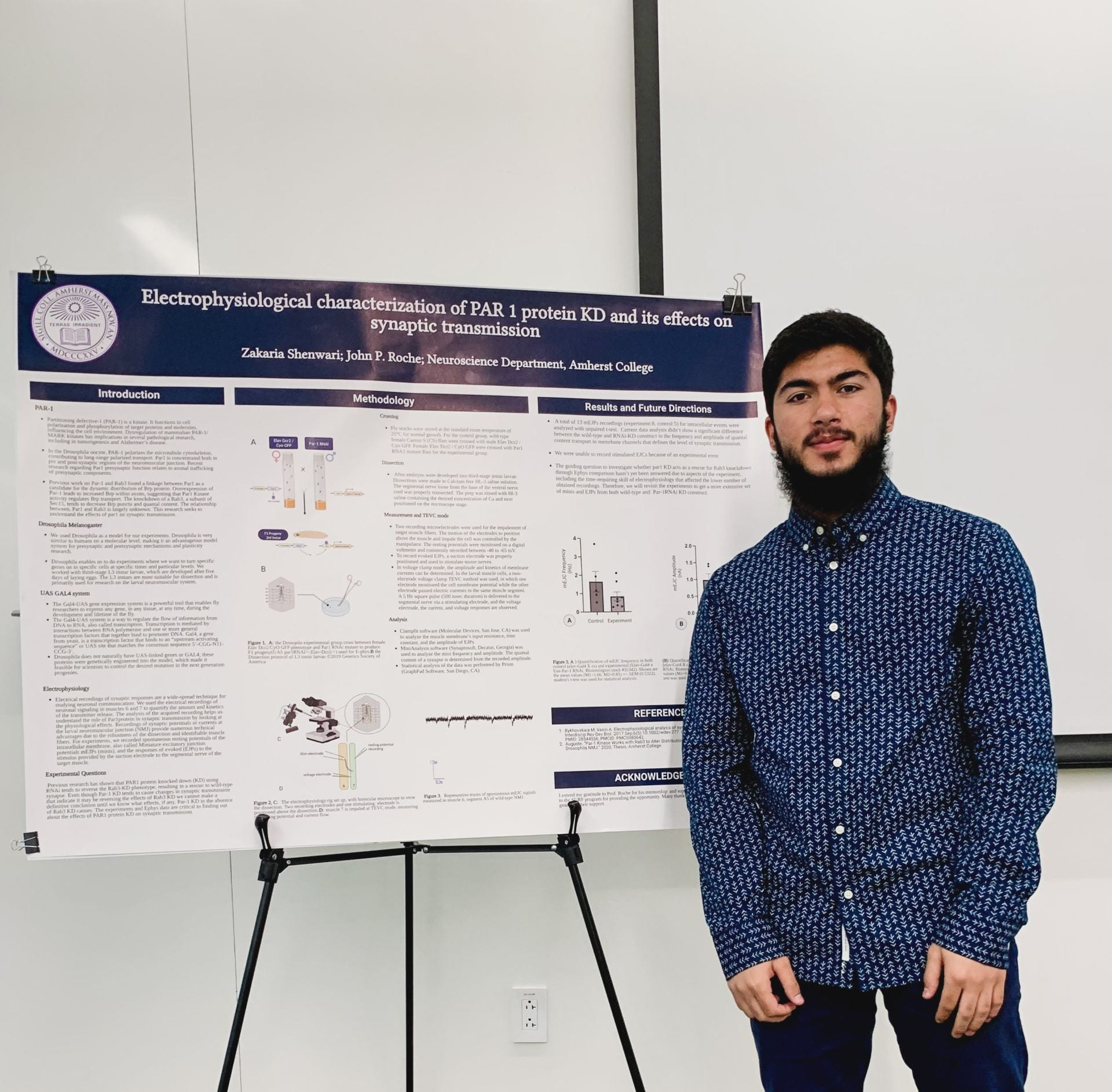
Photo courtesy of Zakaria Shenwari.
Could you briefly describe your research?
“Of course! Our lab research is concerned with Drosophila—a fancy name for house flies. We are using the JR neuromuscular junction of Drosophila as a model system. Every student’s research is different, [but] I was assigned to research one of the proteins called PAR-1 within the presynaptic region of the Drosophila’s NMJ(Neuromuscular Junction). Procedure-wise, we would knock down the protein in a specific larval stage of Drosophila and explore how that impacts the synaptic transmission. Then we would use electrophysiology to analyze the data and compare with the wild and control groups.”
What would be the implications and potential applications of your research?
“Neuroscience research is mostly concerned with the brain, system, control systems, and different perceptions of the brain. Some specific diseases that researchers are primarily interested in include Alzheimer’s and Parkinson’s. From previous research, PAR-1 seemed to facilitate another protein called TAU, which is involved in Alzheimer’s disease.
My research about the function and effects of PAR-1 could help us know what is going on in an Alzheimer’s patient’s nervous system. So that would be our goal: [understand] what the par-1 does so, in the larger scheme, we can [learn] more about TAU and Alzheimer’s.”
What kind of responsibilities did you have during the summer?
“In my group, there were six students, and most were working on individual projects. My main responsibility was [taking] care of my Drosophila samples because I needed to perform genetic crosses to get a specific 1st generation progeny.
Besides that, I would dissect Drosophila larvae, particularly in the 3rd stage of development, under a microscope. After the dissection, I would use a machine to perform the electrophysiology.
It sounds demanding, but I would say that the schedule was pretty flexible. We had to be there from nine to five and, in addition to the hands-on lab, we had research papers assigned to us each week that we would compile for the background sections in [our papers].”
You talked about how you had to dissect under a microscope and ephys: was this a skill you already possessed before coming to SURF or was it something new that you learned from SURF?
“No, I never had this experience before, and I definitely didn’t have all the skills that were needed in the lab. SURF is a program intended for 1st and 2nd years [with] little to no research experience.
Our supervisor was very patient and [knew] that the students [working in the lab] needed to ask a lot of questions. He didn’t expect us to know anything, and he was involved in instructing and mentoring us, helping us learn the things like Electrophysiology. It took me a long time to actually learn it, something like 3-4 weeks. It was a complicated skill, but I would say that you don’t need much [prior experience or skills] to [participate] in SURF.”
What do you think was the most challenging aspect of SURF?
“I think because I had to learn so many new skills in a short period of time, the time crunch was the most challenging aspect of SURF. For me, as I mentioned before, learning electrophysiology and learning to get proper dissections were the most challenging. SURF [challenges] you, but it was rewarding in many ways and worth it.”
What do you think was the greatest takeaway from SURF?
“I guess it was a combination of things: responsibility, learning skills, exposure to research, and meeting new people. Ultimately, the program is a big commitment, and because of the ‘immersive’ experience, I think it made the experience valuable.”
Do you have any advice for underclassmen who are interested in SURF or research?
“Yes! I would say if you are interested in research, there are many opportunities at Amherst and beyond Amherst. Don’t hesitate to reach out to professors and ask them for availability in [their] labs: email them or meet them in person [because] most professors are quite approachable. They would love to tell you about [the research] that is happening in their lab and would even be open to showing their lab to you. [However], it’s not [guaranteed] that when you meet with a professor, they will allow you to work in their lab because it depends on [their] availability and interest. It is alright if you don’t get in [to SURF], too: you can reach out to the Loeb center [because] there are more opportunities out there than you expect.
Even if you are not particularly interested in becoming a researcher, I think SURF is still a program to check out because it is more of an exploration of research rather than a commitment to becoming a researcher.
Bottom line—if you are interested, reach out and enjoy your time wherever you are.”

You must be logged in to post a comment.